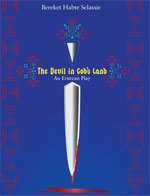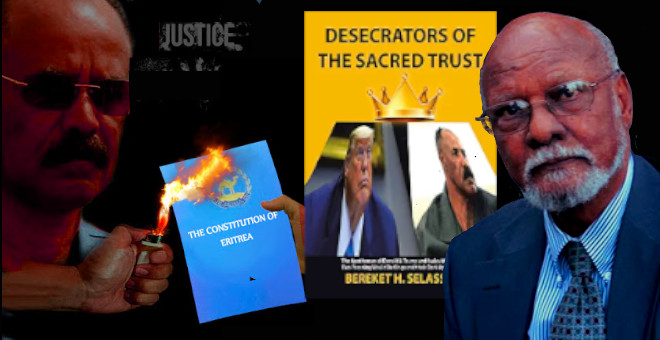The Devil In God’s Land, A Play By Bereket Habte Selassie

The Devil in God’s Land: Paperback, $19.95, 130 pages, 229×152 mm, Mkuki na Nyota Pulblishers, Tanzania, 2011. ISBN 9789987081615,
“Have you forgotten your vows to the martyrs? Can you honor your vows while in the cruel embrace of the powerful?” Zegonfo II asking Senai in Act One, Scene One, Page 3.)
Who is “The Devil” and “Where is God’s Land” in Dr. Bereket Habte Selassie’s newly released play, “The Devil in God’s Land.” According to Egyptians legends, ancient Eritrea—Punt—was where the gods used to come for relaxation. How the Devil came to live and rule in God’s Land is where the play sprouts forth to stir self-reflection, invoke anger, provoke action and inspire one to take charge of destiny. My advice as you traverse the rugged and sometimes smooth terrain of “The Devil in God’s Land” is to buckle up for you will certainly feel all sorts of emotions this land of ours invokes in man, the Devil and God. You can start by asking why the Devil is in the singular and the gods of Punt were in the plural to appreciate the irony of our present predicament where those responsible for our liberation are represented by one man and the man who is responsible for our misery is represented by many real and imaginary enemies. (You can order a copy from: http://www.africanbookscollective.com/books/the-devil-in-gods-land
The Devil in God’s Land mirrors life in post-independent Eritrea and particularly in post 1997 when the man at the helm of power refused to implement the ratified constitution, thus stemming out any hope for democracy and constitutional governance. In February 2002, The Eritrean National Assembly passed an infamous resolution condemning the group that came to be known as G 15. Dr. Senai, the principal protagonist and a ranking member of the Assembly is engaged in self-flagellation for taking part in the event that has become in the words of Zegonfo II “part of the hideous story of our wounded nation.”
If you’re from Asmera and over the age of 35, you’re more likely to know the famous Zegonfo who spoke openly in the streets of Asmera about all sorts deemed risky—mainly politics— under the pretext of insanity. The playwright chose a bar in downtown Asmera where Zegonfo first appeared to illustrate the Biblical truth that “Wisdom calls aloud in the street, she raises her voice in the public squares.” (Proverb 1:20) Similarly, the great Socrates had said that he learned about wisdom not from the fields or the trees, but by conversing with people in the market. Insanity or its useful camouflage liberates Zegonfo from any self or societal imposed inhibitions and is free to express himself. It is the recognition of this fact that all democratic countries consider freedom of expression a fundamental and an inalienable right. This is how Dr. Bereket weaves this important belief through a character named, Aster, Senai’s wife and a former ELF fighter who joined the EPLF with the Fallul group.
Aster: There is nothing wrong with asking questions in search of the truth. We need that. In fact that is what has been missing here for a long time. We used to ask hard questions during the struggle, you know. It is only in recent years that we have been muzzled or we have imposed self-censorship. (Act One, Scene One, page 11.)
The playwright, true to his former works “want(s)—like Zegonfo II—to get to the bottom of it and expose it to the world.” The Devil in God’s Land” is in a way “Wounded Nation” artfully spiced with the proverbial poetic license. The poignant familiarity of Eritrea’ tragic history compels the characters to leap out of the pages and forcefully engage the readers to share Dr. Senai’s self-flagellation and the wounding of a once promising young nation. The art-imitating-life drama induces the readers to scream, stand up and speak on behalf of voiceless victims because of the moral imperative and practical concern that their silence could and would be construed as consent.
“I cannot keep silent when I see and hear injustice in a land whose heroes fell fighting for justice.” Zegonfo II (Act 4, Scene 2, page 95)
“They spoke the truth. And the truth which is the most potent liberating force, caused their imprisonment. The truth should set people free, not cause their imprisonment. But such is the irony of life in our poor nation. Mind you, this is the sacrifice from which redemption will come sooner or later. There can be no redemption without sacrifice. Have no fear. Be bold, be valiant, be strong.” (Act 4, Scene 2, page 96)
The G 15 invoked the implementation of the same ideals that prompted and sustained Eritrea’s 30 years liberation struggle. There are many questions that are duly haunting Eritreans in general and the former freedom fighters in particular: Were we serious about the ideals of our liberation struggle? Were we just paying lip-service to them and who has betrayed these glorious ideals?
In the opening scene of Act Two, Scene One, appropriately titled, “Veteran’s Dilemma,” Dr. Senai and comrades secretly meet at Inda Mariam Cemetery which ironically turns out to be the most appropriate place. Normally, people go to cemeteries to lay flowers in memory of loved ones; a symbolic act that those who passed on are not forgotten. But, practically, it was the last place the security apparatus would suspect Senai and company, thus giving them a much needed temporary refuge. Seeking shelter in a cemetery where their comrades are permanently rested and plotting to replant the seeds of freedom for which they died for was the poetic way to get rid of the Devil in God’s Land or the mythical Phoenix rising from the ashes in the freshness of youth.
Senai: You know, I feel one with those of our comrades who are interred here. I feel a sense of community with them. We have sacrificed so much to help liberate our country, and I feel betrayed. Although I am alive, I feel close to the dead in my sense of loss. Don’t you?
Other Participant: I do.
Senai: It is a crippling feeling. It leads one to despair and regret. Was it worth squandering our youth for and sacrificing our families? What does the future hold for us and for the country?
Other Participant: Aren’t we meeting here to provide an answer to that question?
Aster, Senai’s wife had made so many charges against the National Assembly and raised important questions the previous night and Senai was keenly aware that these questions need to be addressed. “After all; we (they) didn’t spend our (their)youth fighting for freedom only to be enslaved by fear, reduced to a bunch of frightened goons.” (Deputy in Act 4, Scene 1, page 71)
Aster: What is happening? I mean, I know you have been having important meetings; it has been all over the media, after all. But you must know, this time people don’t care any more. They have given up hope. People are saying that the man forced you to pass those resolutions that we heard on the radio.” (Act Two, Scene One, page 4.)
…Why are you people acting like cattle being taken to the slaughterhouse? Why can’t you protest? What has happened to Eritrea’s manhood?” (Act Two, Scene One, page 5.)
To understand the play, one has to read between the lines and should not let the familiar themes play tricks on him/her. Most good books do not share their secrets easily and this one is not an exception. Every character and scene represents the main issues and challenges confronting Eritrea. Like Jacob wrestling an angel, you’ve to wrestle with it to understand the political, moral, Biblical and legal insights this play is full of. When you read the following dialogue between Wedi Tikul, Chief Judge and Former Chief Judge; ask yourself what Wedi Tikul, the premier EPLF’s singer who inspired a generation of Eritreans to fight for freedom and justice, through his art and music represent.
Wedi Tkul: May I ask just one question?
Chief Judge: [impatiently] What is it? Hurry up.
Wedi Tikul: When this process began, the judge sitting on your right acted as the Chief Judge and you were the third judge. How did you switch roles and why is he keeping quit now?
Chief Judge: He is quiet by nature.
Wedi Tikul: He wasn’t quiet before you took over. He was speaking his mind and he was fair. What happened in between?
Chief Judge: This is a matter of state secret and does not concern you.
Wedi Tikul: It is a matter of judicial ethic and fairness, and as such it concerns me, since I am a party in the matter. I ask the former Judge to answer me.
Former Chief Judge: First of all let me say how much I have enjoyed your songs over the years. They sustained me and others during critical times during our struggle. When I was acting as former Chief Judge earlier today, I had a lucid interval during which I was prepared to administer impartial justice. The lucid interval has now elapsed. This is all I can say, if I know what is good for me.
Wedi Tikul: But I want to know what happened to change you?
Chief Judge: I had a relapse. I relapsed into the revolutionary mold of justice.
Wedi Tikul: How so? Why so suddenly?
Former Chief Justice: As Confucius said, “Many are the ways of revolutionary justice and of Cochin China hens.” (Act 4, Scene 2 and page 87)
It is often said that there is no sinner without a future and a saint without a past. But for a true transformation to take place, it has to be preceded by a true confession and atonement. This is an important lesson that is totally lost among all Eritrean leaders whether of EPLF or ELF background; they have yet to face their old demons and acknowledge their faults, mistakes and failures. It is hard to imagine Saul becoming Paul on the way to Damascus without the following acknowledgement:
“For you have heard of my previous way of life in Judaism, how intensely I persecuted the church of God and tried to destroy it. I was advancing in Judaism beyond many of my own age among my people and was extremely zealous for the traditions of my fathers.” Galatians 1:13-14
Similarly, here is what the unidentified prisoner (Act 4, Scene4, page 76) said to the Tall man who is in charge of everything in Eritrea:
Well that is something you can’t take away from me. And by the way, why this ridiculous blind fold? I mean, we know we cannot escape from Sahel prisons; after all, we used to be on the captors’ side of the fence in those days. This reversal of fortune in which we find ourselves is becoming ludicrous every day. If the fruits of our 30 years struggle is what we see in present day Eritrea, then, the question of how to bring change and what kind of change takes center stage. Zegonfo brings it home to Dr. Senai: Can you honor your vows to the martyrs? Can you honor your vows while in the cruel embrace of the powerful?
There can be no redemption without sacrifice. Have no fear. Be bold, be valiant, be strong.
Don’t be too timid. Stand up for your rights and fight! Being timid is how he has got his boots on your neck.
A Tigrinya proverb says: Teba’in tkn mewtsi’e ays-in. A brave like smoke will always find a way out. When Zegonfo was threatened by Andu, the antagonist of the story:
Andu: I can arrest you, you fool.
Zegonfo II: Yes you can, but I’ll slip through your bloody fingers like the fog of Nefasit.
Sister Dolores, a Catholic nun and my second favorite character in the play, had to wrestle with a much bigger moral conundrum of serving God and mankind. She finally concluded that one can’t be true to God while remaining indifferent to the suffering of the people. She believed in an all-encompassing love that saves body and soul and in the honorable tradition of our martyrs, fought the good fight and fell in action. She recognized the boss was the Devil in God’s Land, and had to ensure that once gone, he would never return.
Thin Man: have it from the grape vines that she was engaged in a tussle with the boss. By the way, how is he?
Andu: He is alive.
Short Man: But alive with diminished manhood. [He let out a loud laughter].
Thin Man: Is he in the country?
Andu: No, he is in Qatar undergoing medical treatment. But is okay, he will survive. This too shall pass.
Short Man: Yes, but he lost his vital manhood, his virility. He is half the man he was, isn’t he? (Act Four, Scene Four, page 117.)
The Devil had lost his virility; no devil off-springs. We kill the Devil and no Devil in God’s Land. God’s Land must be for God only.
Zegonfo II: I will tell the story of the heroic Sister Delores who squeezed the vital life out of the dictator before he choked her to death. Because of her heroic act, the dictator is now half the man he was. Long life the memory of our martyrs. Sister Delores is one of our martyrs. May her memory be revered for ever. Say Amen!
Amen!
Semere T Habtemariam
Author of the novel “Hearts Like Birds.”
He can be reached at weriz@yahoo.com and www.facebook.com/SemereHabtemariam




Awate Forum